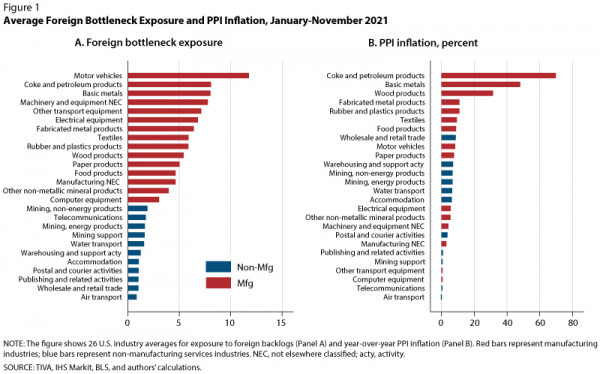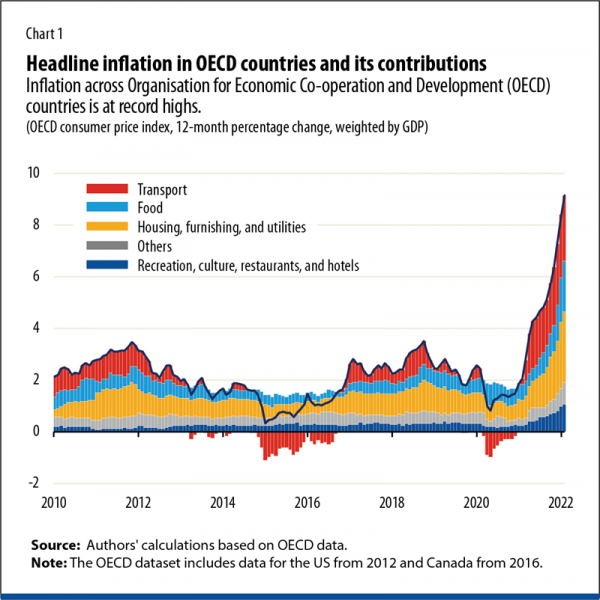It’s safe to say the world is unrecognizable compared to where it was three years ago. The pandemic has stressed the world’s supply chain network to its breaking point and revealed how vulnerable it is. The war in Ukraine has reignited geopolitical fears. And the massive inflation sweeping the globe isn’t doing anyone any favors.
Quarantines and lockdowns are just a regular facet of life now. Essential goods are inching out of reach of the common man.
How exactly is your business supposed to survive during times like these?

Average foreign bottleneck exposure and ppi inflation (Source)
Grab Your Bootstraps
Even though the pandemic has been ongoing for more than two years, the world is still reeling from its effects. The economic fallout from lockdowns and increased border controls continues to reverberate worldwide.
What moves should a responsible business owner make during this time to survive? What lessons can be learned? Are there any opportunities that can be leveraged during this once-in-a-century pandemic?
It’s a world of uncertainty out there. Despite multiple warnings from the scientific community, the world has run face-first into a brick wall. Even though there have been multiple warnings about the possibility of a pandemic, the global supply chain network is still weaker than ever. This is in large part because the supply chain market has become more efficient. This makes it more likely for raw materials to be harvested in one country, processed in another, put together and packaged in a third, and then sold in a fourth country.
As seen with personal protection masks and ventilators, this way of splitting up work makes an operation more dependent on other people. Each part of the mask is made in a different country. Almost a dozen different entities work together to put the mask together and sell it.
The most important thing to learn from the past two years is that the market favors people who can change and adapt quickly. No matter how fantastic your business model is during predictable times, any global upheaval has the potential to obliterate your business in an instant.
Practical Examples And Takeaways
Think about how the restaurant business has changed as a great example of how to change in these times.
When the pandemic hit, footfall in most restaurants dropped. It was not possible to maintain social distance in restaurants, and the fact that people had to pull down their masks to eat food made them a perfect site for spreader events.
Restaurants that had never considered offering takeaways made it their main priority overnight. Many restaurants would have perished without embracing change and adapting to the market’s needs.
The real estate industry had a complete stoppage of business because people could no longer drop by houses and sites to inspect them for purchase. They responded by investing in augmented reality and virtual reality technologies. Today, they can offer virtual tours of properties and lands so that potential buyers can look at what they have to offer from a safe, virtual vantage point.
E-commerce quickly surpassed brick-and-mortar stores. White-collar offices embraced virtual meetings and remote work with the snap of a finger to keep their existing projects alive.
Due to problems in the supply chain, the critical lack of personal protective gear became a huge topic of conversation all over the world. In response, manufacturers completely changed their processes so they wouldn’t have to rely on other people to make products in their own area.
Innovate To Survive
Companies hastened their digital transformations. People who work in logistics started to try out new ways of doing things, such as real-time order tracking, end-to-end inventory visibility, and super-reverse logistics.
Others cut down on maintenance costs by getting rid of staff, cutting back on hours, and getting rid of anything that wasn’t essential. Parting with your key employees in the best way possible is absolutely crucial if you want them to return when things are looking up again. Simple soft skills that few businesses would even think to use are very important for being able to hibernate successfully during these hard times.
Maintaining goodwill among clients and employees may be the only way to keep a business afloat if it lacks the financial resilience to pay the bills during the global upheaval.
Because chances are, this won’t be the last supply chain disruption, global pandemic, or geopolitical upheaval most of us will face in our lifetimes.
Among the laundry list of things scientists and researchers have warned us about, climate-related immigration and refugees look like they’re next on the list. The potential fate of the semiconductor industry in the next decade or so is up for grabs as well.
Your business will fail no matter how profitable it is, as long as it doesn’t incorporate financial resilience. Resilience is the ability to tolerate chaos and unprecedented events in the future.
The most important factors businesses should focus on are:
- Locking down supply bases
- Creating meaningful relationships between employees and clients that last.
Businesses that focus on big, fluffy, buzzword-filled business models that are built on shaky ground will fail when the next crisis causes disruptions and war by attrition. Aside from taking care of your health, a big part of getting through hard times now and in the future will be motivating the key people in your business and building goodwill.

Headline inflation in OECD countries and its contributions (Source)
Conclusion
It’s unsettling to think of 2020 as the tip of the iceberg we’re all about to face. COVID-19 caused a worldwide trauma that will almost certainly lead to more crises in the future. At least a couple more are expected in this decade.
Everything we’ve learned over the last two years will be crucial to surviving these challenges. During predictable times, efficiency may be a means to minimize costs and maximize profits, but in chaotic times, inefficient practices that aren’t overly fragile with a reliance on external factors to make things happen will be required.



